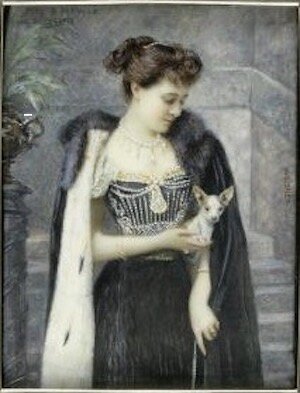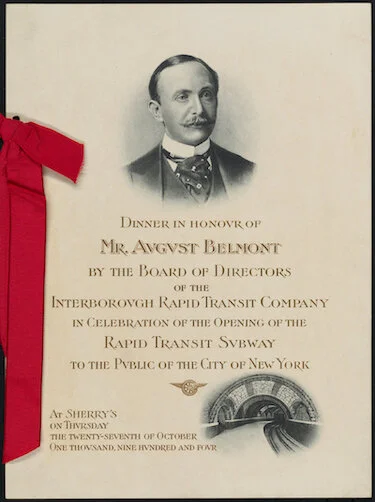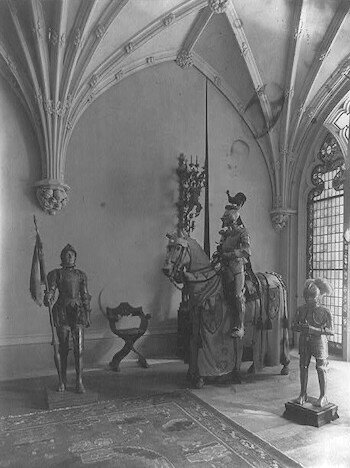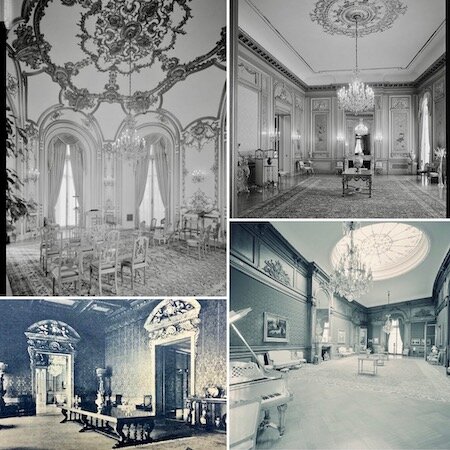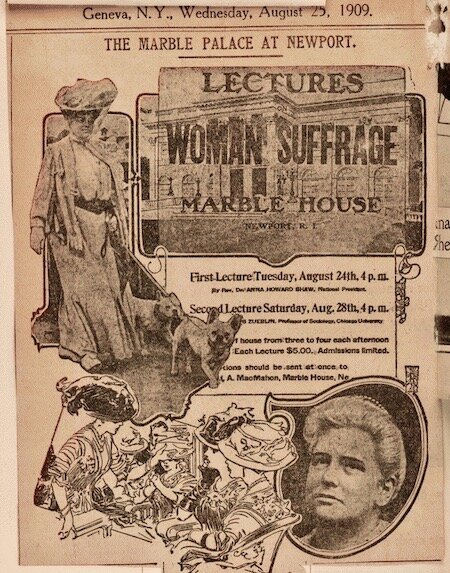The Belmont Boys and Girls Part 3: On the Top at the Dawn of a New Century
The dawn of the twentieth century found the Belmont brothers at the peak of their power and prestige with the press eagerly chronicling their every move. Its first years also brought loss with the death of their only sister Fredericka Howland in 1902. Although she had moved from New York more than fifteen years before, she was often called on by her brothers to act as hostess for their events in New York or Newport and her loss in the family circle was acutely felt.
Portrait of Fredericka Belmont Howland by Carl A Weidner, Luce Center, New-York Historical Society
August Belmont (with a son by the same name he was no longer “Jr”) continued to helm the family firm, August Belmont & Co. It thrived under his under his leadership and he gained a reputation of having a Midas touchwithin the financial world . Amongst his other investments, August financed New York City’s first subway line.
While dozens of gilded age plutocrats could boast having their own private railroad car, August was the only man in the world to have a private subway car as well.
Interior view of Belmont’s private subway car, The Mineola
He maintained two estates on Long Island; Blemton Manor in Hempstead
and his parent’s former 1200-acre estate in Babylon called Nursery Farm (he added his polo ponies to the various other herds and sundry flocks kept there). One of the country’s leading figures in thoroughbred racing, like his father before him, he also established a horse breeding operation near Lexington Kentucky named Nursery Farm after the Long Island estate.
One of his most enduring contributions in the world of horse racing was his financing the construction of a new racecourse in Elmont New York. Named Belmont Park, it opened in 1905.
The Belmont Stakes (founded by his father in 1867), began running there from that year on. His activities in the sporting world were by no means confined to the turf however. He continued to breed champion fox terriers at Blemton and launched a new seventy-foot-long racing yacht named the Mineola, in 1900.
In 1900 August purchased a large brownstone at 44 East 34th Street, around the corner the home he had shared with his deceased wife Bessie at 190 Madison Avenue.
Interior View of August’s 34th street house photo: Museum of the City of New York Digital Collections
Five years later he bought the two adjoining properties at 46 and 48 East 34th Street to build a house for his eldest son August Belmont Jr, in anticipation of the latter’s 1906 marriage to Alice de Goicouria.
Eldest brother Perry Belmont continued to be a major force in Democratic political circles.
Marrying the former Jessie Sloane hours after her husband divorced her in 1899, the couple decided to move from the townhouse Perry leased at 855 Fifth Avenue (perhaps it was just a little too close to her previous family on 72nd street for comfort). After leasing a place at 24 West 57th Street the couple bought a townhouse at 580 Fifth Avenue in 1902. Although they had it renovated, they considered it a temporary abode, planning to build a new mansion uptown at Fifth Avenue and 92nd street eventually.
Despite an appendectomy sidelining Jessie for part of the 1900 season, the couple began entertaining at By-the-Sea by that August. Though their marriage had been the society scandal of the year, they eased back into the New York and Newport social swim fairly easily.
By-the-Sea’s garden
Jessie took top honors at the 1902 Newport Flower Show
Jessie had a weakness for jewelry. Forced to return all of the baubles given to her by ex-husband Henry Sloane as part of their divorce settlement, Perry was more than happy to rebuild her collection, which became legendary over time.
Contrary to the eadlineh - Jessie never actually owned the Hope Diamond
The couple spent time in Paris each year. Perry would also go to England to race his horses, where Jessie’s beauty and jewels garnered her attention and admirers.
Back in the States, they rented a house in Washington DC on Scott Circle, where they hosted lavish entertainments for politicians, socialites and the diplomatic community. While social resistance to the couple predicted by some in New York had failed to materialize, they came up against a very powerful foe in Washington in the form of First Lady Mrs. Theodore Roosevelt. Not only did she refuse to receive them, she also forbade the wives of her husband’s Cabinet members from attending the Belmonts’ parties as well. Perry, who served as President of the Turf and Fields Club and the United Hunts Association, was surprised to encounter resistance when he tried to join the Chevy Chase Hunt (a club founded in part by his brother-in-law S. S. Howland back in 1886).
Even more shocking was the discovery that they were not listed in the newest edition of the Washington Social Register (Mrs. Roosevelt’s social secretary coincidentally served as its de facto editor). Heavy lobbying on their part eventually rectified the last two situations, and they decided to build a new home in the Capital splendid enough to host entertainments that would eclipse those given at the White House.
1900 found Oliver and Alva Belmont shuttling between a townhouse at 677 Fifth Avenue and their Long Island estate Brookholt.
677 Fifth Avenue (center). It would later serve as the residence of Cornelius and Grace Vanderbilt for a time.
While still a bon vivant, Oliver also seemed to have discovered a newfound serious side after their marriage. Dabbling in politics, he purchased a Democratic newspaper and was elected to Congress, serving one term beginning in 1901.
As Mrs. Astor entered her twilight years, Alva ruled Newport society in the first decade of the twentieth century, as part of the great triumvirate (with Tessie Oelrichs and Mamie Fish) and other young matrons.
The couple changed their minds about building uptown on Fifth Avenue and 71st Stree, and instead purchased several lots along Madison Avenue at 51st Street. They engaged Hunt and Hunt to design a new townhouse for them, its façade inspired by London’s Lindsay House, designed by Inigo Jones.
Lindsay House, London
While the new home was under construction, Oliver died in June 1908 at Brookholt of septic poising from his recent appendectomy. August and Perry reached out to Alva during Oliver’s illness and August Belmont jr, remained by her side through the whole ordeal. Some papers noted this as the end of the fraternal feud between the Belmonts (although the press also reported brothers socializing with each other as far back as 1902). Alva completed the mansion at 477 Madison Avenue, including Oliver’s planned armory and library in it as a memorial to him.
477 Madison Avenue
She also had a replica of a chapel of St Hubert in France’s Loire valley built in Woodlawn Cemetery to serve as a mausoleum for the both of them.
Belmont Mausoleum in Woodlawn Cemetery photo: Digital Collections, Museum the City of New York
in 1908 August purchased a stud farm in Normandy, Haras de Villers, adding to his breeding operations.
Present day view of Belmonts former stud farm in Normandy
Perry and Jessie contributed to the family’s real estate glory in 1908 as well, when their magnificent new Washington mansion was finished. Parisian architect Ernest Sanson designed the wedge-shaped (adapted to its triangular lot facing Dupont Circle) “hotel particulier” while Horace Trumbauer’s architectural firm oversaw its construction, which took two years.
Rendering of the Belmont Mansion
One entered under a porte-cochere at its narrow end into an oval hall finished in creamy caen stone, with ground floor living apartments for Jessie and Perry beyond it. The main focus of the home, however, was up the grand staircase where a spectacular suite of entertaining rooms, including a reception room, salon, dining room and massive ballroom occupied the piano nobile. The Belmonts immediately began entertaining on a scale to match their new surroundings.
Interior views of the Belmont House (clockwise from upper left) Oval salon, reception room, ball room, dining room.
While still “personae no gratae” at the Roosevelt White House, they were on friendly terms with the Tafts, whose administration to follow would remedy that situation soon enough.
In 1909 August sold the building lot on Fifth Avenue and 81st Street he had bought back in 1893, realizing a tidy profit from developers who planned to erect a luxury apartment building on it. That did not solve the problem of the increasingly commercial nature surrounding his home on 34th Street however, as business continued to expand into the fashionable residential precincts of midtown. August also purchased By-The-Sea from Perry and Jessie that year. He embarked on major renovations there, fueling rumors that he would soon marry Eleanor Robson, one of the leading actresses of the day with whom he had been romantically linked for some time.
Even bigger news in 1909 associated with the Belmont name at Newport came from Alva’s direction. Having thrown her significant energy and resources behind the Woman’s Suffrage movement after Oliver’s death, she hosted a conference on the subject at Marble House (which she began occupying again).
Two years later, she made more waves in the press after she opened a school to train female farmers at Brookholt in 1911.
August and Eleanor wed in April 1910. Eleanor retired from the stage and seamlessly adapted to her new life as a socialite, (famously stating “a private railway car is not an acquired taste, one takes to them immediately”) sharing August’s interest in horse breeding and racing.
The renovations to By-the-Sea were complete for the 1911 season, adding a layer of neoclassical flourishes over the cottage’s Italianate core.
By-The-Sea after renovations
Eleanor swiftly became known for her philanthropy. One of her more interesting causes was known as SPUG (the Society for the Prevention of Useless Gifts), an organization she founded with fellow philanthropist Anne Morgan around 1912. It intended to battle the increasing commercialization of Christmas by ending the wanton exchange of gifts without sentiment (while briefly popular, in the end it was not one of her more successful charitable ventures).
Over the next several years, the various Belmonts pursued their interests pertaining to their spheres of influence with gusto. Jessie and Perry centered the fashionable American colony in Europe, hosting exclusive dinner parties in their suite at the Ritz in Paris and leading the chic set to St Moritz at the start of the 1914 winter season.
Alva had a replica of a Chinese tea house built on the grounds on Marble House, which she inaugurated during her second Women’s Suffrage Conference held there in early July 1914.
It was followed by a Chinese-themed dinner dance for Society a week or two later.
July 29th saw August’s newest venture, the construction of Cape Cod Canal, open to limited traffic.
The day before the Canal festivities, Austria-Hungary declared war on Serbia. Though they could not realize it at the time, the Belmont’s privileged world was about to change irrevocably. More on that in Part 4, the conclusion of the series (to read the previous installments, you can follow this link to Part 1, and this link to Part 2).


